- Home
- Jonathan Stroud
Lockwood & Co. Book Three: The Hollow Boy Page 8
Lockwood & Co. Book Three: The Hollow Boy Read online
Page 8
Without the protection of iron chains, the full chill of the apparition tore into me. The temperature at my belt was down to forty-four degrees; it would be colder still near the chair. But the degree of cold isn’t really the point; it’s where it comes from. Ghost chill is a fierce, dry cold; you can feel it sucking the life and energy from your bones. I bore it. I didn’t move at all, but just stared at the old man.
“If you have a purpose,” I said, “you might as well tell it to me.”
Just the silence and the glittering of the eyes, like starlight in the dark.
No real surprise. It wasn’t a Type Three, scarcely even a Type Two; it couldn’t speak, couldn’t communicate in any obvious way.
Even so…
“No one else is going to listen,” I said. “Better take this chance while you can.”
I opened my mind, tried to empty it of sensation, see if I detected anything new. Even an echoing mess of emotion, like I’d gotten from the Changer at Lavender Lodge, might be enough to set me on the right track….
From the chair came a scratchy rustling of fabric, a pick-pick-picking sound, like cloth being teased and pulled by the tip of someone’s nail. I heard shallow breathing, a person muttering under their breath. My skin crawled. I couldn’t take my eyes off the smiling apparition in the chair. The sounds came again—muffled, but very close.
“Is that it?” I asked. “Is that what you’re telling me?”
A crash in the corner—I sprang up in fright, scrabbling for my rapier. The ghost was gone. The chair was empty; the squashed seat, the worn patch, everything exactly as before. Except for the walking stick, which had toppled over, cracking against the fireplace.
I checked the time—then rechecked it with something like alarm. Ten twenty? That was weird: according to the watch, the apparition had been present for more than half an hour, yet it had felt like scarcely a minute to me….
“Did you get it?” The skull’s voice jerked me back into action. The face in the jar had re-emerged, nostrils flaring smugly. “Bet you didn’t. I did. I know, and I’m not telling.”
“What is it with you?” I said. “You’re like a toddler. Yes, of course I got it.”
I rose, crossed to the door, and switched on the light, ignoring shrill protests from the jar. The evil atmosphere had vanished from the room. Under the ceiling light, the outdated shabbiness of the furniture was revealed in all its muted oranges and browns. I looked at the stack of kids’ games: Scrabble, Monopoly, and the Rotwell Agency’s Ghost Hunter—that one where you have to remove the plastic bones and bits of ectoplasm without setting off the buzzer. Battered boxes, secondhand games. The house of an ordinary family without much cash.
He was a difficult man. Not generous with his money….
I walked over to the chair.
“You haven’t a clue, have you?” the ghost called. “Tell you what: let me out of this jar, and I’ll happily spill the beans. Come on, Lucy. Can’t argue with that for a deal.”
“Don’t try to flutter your eyes at me. It doesn’t work with empty sockets.”
I bent beside the chair, inspecting the nearest armrest. The patch at the end was made of some kind of imitation leather, more plasticky than anything. It had been roughly sewn onto the original fabric, but in places the stitches had come undone, and one corner was curling up like the edge of a stale sandwich. I pushed at the edge experimentally, slipped my fingers underneath, and lifted it. There was a layer of foam stuffing, which came away easily. Then you could see the tightly wound wads of banknotes compressed into the space beneath.
I grinned at the skull over my shoulder. “Sorry. Looks like no deal for you today.”
The face grimaced and vanished in a starburst of peeved plasm. “That,” its voice said, lingering, “was just a lucky guess.”
I took my vacation and went back north, to the town where I was born. I saw my mother, I saw my sisters; I stayed with them for a few days. It wasn’t the easiest of homecomings. None of them had ever traveled more than thirty miles away in their lives, let alone gone to live in London. They looked askance at my clothes and shining rapier, frowned at the smallest changes to my accent. The scent and aura of the city hung around me. I spoke with an assurance they didn’t recognize about places and people that meant nothing to them. For my part, I found them slow and hidebound by their fear. Even in good weather, they went out only reluctantly; evenings saw them cowering by the fire. I grew impatient, and crosser still when they scarcely argued back. There was something in their sheeplike resignation that made me want to scream. What kind of life was it, to sit dumbly in the dark, in living fear of death? Better to go out and face it, head-on.
I left them a day earlier than planned. I had an itch to get back to London.
It was an early-morning train. I sat in a window seat, watching the tapestry flash by: the fields and woods, the spires of hidden villages, the chimney stacks and ghost-lamps of the ports and mining towns. Everywhere you looked, the Problem hung invisible over England. Brand-new cemeteries at crossroads and in wild, abandoned places; crematoria on the edges of cities; curfew bells in market squares. Superimposed upon it all, my face blurred in and out of view. I glimpsed the child I’d been when I first came down to London, and the operative I’d now become, a girl who spoke with ghosts. More than spoke: who understood their desires.
My encounter with the miser’s ghost had changed everything for me. It had been that strange sensation I felt afterward, walking back through Whitechapel, with all my tools still on my back, and all those unused flares and canisters jangling in my belt. I hadn’t needed any of them. I’d dealt with the Visitor without resorting to weapons or even defenses. No salt, no lavender; not an ounce of iron spilled. How many times, in any agent’s career, had a successful investigation ended in quite so neat a way?
The old man in the chair had been unpleasant, and his ghost still radiated that blackness of soul. Yet he had come back with a coherent purpose, a desire to make restitution—to reveal the hidden money to his heirs. My calm interrogation had given him the chance to do precisely that. If I’d blasted him in the usual way, that outcome would not have been possible. But I’d done it by giving my Talent free rein.
There were obvious dangers attached to my new approach, but great advantages, too; and as I gazed out through the window a new way of working began to open up in front of me.
The skull in the jar was still the exceptional case, the Type Three ghost with which full communication was possible. But I was coming to believe that there were other ways of bridging the gap between ordinary Visitors and the living.
My hunch relied on two things: that many ghosts had some objective in returning; and that, if you calmly sought to discover this, they would leave you alive long enough to find it out. The first part of the statement was uncontroversial—it had been accepted since the days of ghost-hunting pioneers Marissa Fittes and Tom Rotwell fifty years before. But the second part flew in the face of orthodox opinion. Every modern agency sought to constrain the ghost as a matter of first principles; when this was done, the Source could be found and destroyed, thus removing the ghost as well. It was universally assumed that the ghost would resent this process, and seek to prevent it. Since an angry ghost could quickly kill you, agents weren’t inclined to mess about.
In some cases, weapons were certainly necessary. Could the terrible thing in the attic at Lavender Lodge ever truly have been reasoned with? Almost certainly not. But others—I thought of the sad Shades thronging in the boardinghouse, the veiled Specter in the bedroom window—were desperate for connection.
And I could provide that, however imperfectly.
What I needed was for Lockwood to let me experiment some more. He would be resistant—naturally so, because of what had happened to his sister—but I felt I would bring him around. At this thought, my mood lifted. The bulb of sadness that I’d been nurturing since visiting my mother shrank deep inside and was forgotten. I would talk to Lockwood and
George about my ideas when I got home. I needed to share them with my friends.
Back in London, I asked the cab to stop by Arif’s store at the end of Portland Row and bought a selection of iced buns. It was past eleven; Lockwood and George would be just about ready for a snack by now. I was back a day early. Since they wouldn’t be expecting me, I could make my arrival an extra-nice surprise.
But there was a surprise waiting for me when I entered the house. It made me stop in amazement, keys held frozen in my hand. The hall had been vacuumed, the coat-rack tidied; the rapiers, umbrellas, and walking sticks arranged in size order in their pot. Even the crystal skull lantern on the key table had been dusted and polished so it shone.
I couldn’t believe it. They’d actually done it. They’d tidied! They’d tidied up for me.
I put my bag down softly and tiptoed into the kitchen.
They were in the basement by the sounds of it, and they were in a very good mood. I could hear their bubbling laughter even from the kitchen. It made me smile to hear them. Perfect. The buns would go down well.
I didn’t hurry. I made some tea, put the buns on our second-best plate (I couldn’t find the best one), arranged them so Lockwood’s favorites—the ones with almond icing that he rarely allowed himself—were on top, and set everything neatly on the tray.
I opened the door with a foot, nudged it wider with my hip, and pattered lightly down the iron stairs.
Happiness bloomed inside me. This was what it was all about. Portland Row was home. My real family was here.
I ducked through the arch into the office and stopped, still smiling. There they were, Lockwood and George, bent forward attentively on either side of my desk. They were laughing heartily.
Between them, sitting in my chair, was a shapely, dark-skinned girl.
She had black hair worn long at the shoulder, a pretty, roundish face, and a kind of dark blue pinafore dress with a nice white top underneath it. She looked very new and fresh and shiny, like someone had popped her out of a plastic case that morning. She sat straight-backed and elegant, and didn’t seem particularly discomposed by having George and Lockwood draped so close. On the contrary, she was smiling too, and laughing a little bit. Mainly, though, she was listening to the boys laugh.
On the table were three mugs of tea and also our best plate, scattered with the remains of several almond buns.
I stood there, looking at the three of them, holding the tray.
The girl saw me first. “Hello.” She said this in a mildly inquiring sort of way.
George’s head jerked up; the fatuous grin on his face at once shrank into noncommittal blankness. Lockwood’s smile tightened; he gave an odd little skip, a sort of sidling sidestep backward, then moved hastily toward me. “Lucy, hello. What a lovely surprise. You’re back early! How was your trip? Nice weather, I hope?”
I stared at him.
“So…” he said. “Good journey? Oh—more buns? How lovely.”
“There’s a girl,” I said. “A girl sitting in my chair.”
“Oh, don’t worry! That’s only till the new desk arrives.” He gave a light laugh. “Should be tomorrow, Wednesday at the very latest. Nothing to worry about….We didn’t expect you back so soon, you see.”
“A new desk?”
“Yes, for Holly.” He cleared his throat, smoothed back his hair. “Well now, where are my manners? This is a time for introductions! Holly, this is Lucy Carlyle, the perfect agent, whom you’ve heard so much about. And Lucy”—Lockwood gave me his biggest smile—“let me introduce you to Holly Munro. Our new assistant.”
It didn’t help that Lockwood was entirely unapologetic when I cornered him in the office. Ms. Munro had left to catch the afternoon bus home. George, more than usually eager to stretch his legs, had accompanied her in case she got lost on the way to the stop, which was all of six doors down the street.
“What the hell happened?” I demanded. “I was only away three days!”
Lockwood was sorting through the papers on his desk. I noticed they had all been neatly paper-clipped, and organized with brightly colored labels. He didn’t look up at me. “I thought you’d be happy. You’re the one who suggested we get in a supporting member of staff, rather than a full-blown agent.”
I stared at him, amazed. “So it was my idea to hire this girl? Please!”
“I told you we needed help. I told you we were going to find someone.”
“Sure, and you waited until I was out of town to do it.”
“Not at all! That’s just a coincidence. Of course I didn’t plan to get someone while you were away. The most I thought was that we could maybe arrange a few interviews, and I only had time to think of that because it’s been so quiet these last few days.” His eyes darted briefly up; he tried an appealing smile. “Obviously that’s on account of you, Luce—we couldn’t investigate new cases with you gone. Your contributions are just too vital.”
“Oh, spare me. And she just jumped out of nowhere, did she?”
“Well, there’s a funny story about that. I didn’t even need to advertise. I bumped into a couple of Rotwell agents, and they gave me Holly’s name. She’d been let go by their agency only last week. I got her in, and she seemed just the ticket, so…”
“So it’s ‘Holly’ already,” I said, interrupting him. “I seem to remember I was ‘Ms. Carlyle’ for months after I joined.”
Lockwood had been more or less addressing his own neck so far. Now he finally looked me in the eye. “Well, that’s because of you. I’ve become a bit less formal this past year. I’m just trying to help her settle in.”
I nodded. “I saw that. If you and George had been settling her in any closer, you’d have snagged your noses on her earrings.” A thought occurred to me. “Did you test her with the skull?”
“What?”
“Did you show her the skull? You know, like you did in my first interview? And all those other objects you made me assess? You gave me a really hard time.”
Lockwood took a careful breath. He tapped long nervous fingers on the desktop. “Actually, we didn’t. But the point is, she’s not going to be a front-line operative, is she? She’s an administrative assistant. Her job is simply to man the fort here. I asked her a few questions, of course I did, but she showed me her résumé, and that was enough.”
“Really? It must have been a nice one.”
“It was very presentable.”
“So what can she do, then?”
“Well, she was at Rotwell for years, working pretty high up—for one of Steve Rotwell’s deputies, I think—so she’s clearly well qualified as a personal assistant. She has some psychic Talent, too. Not as much as us, obviously—but, in a pinch, in an emergency only, she could possibly help us in the field. Also, she seems to know a lot of important people, which might be useful to us one day.” He cleared his throat and deposited himself back on his battered leather seat. The usual cloud of dust did not rise up. “All in all, Luce, I think we’re very lucky to get her.”
“She’s cleaned your chair,” I observed.
“You make it sound like that’s bad. Yes, one of Holly’s main roles will be to keep the place tidy and well organized. In fact, the first thing she did on Monday was roll up her sleeves, put on an apron, and do the whole housemaid bit. George and I couldn’t believe our eyes.” He caught my gaze and threw up his hands. “Well, isn’t that good? One more chore off our list. And she even got us a nice new vacuum cleaner! You were always moaning about lugging that old one up to the attic.”
“What? She’s not been in my bedroom too?”
“Anyway”—Lockwood suddenly became interested in his desk again; he reached out hurriedly for the topmost paper—“I’d better read this, I’m afraid. Some new DEPRAC regulations just came in. Important stuff. Needs a rapid response, and Holly wants me to get it to the mailbox by five…” He looked at me full-on then, serious-eyed and quiet. “I know it’s all a bit sudden, Lucy, but you need to give it a chance. Holly’
s here to help us. You’re the agent; she’s the assistant. She’ll do what we ask, and make life simpler for us. It’ll work out well.”
I took a deep breath. “Guess it’ll have to.” After all, we did need some help. Things could be made simpler. Still…
“Thanks, Lucy.” Lockwood really smiled, then. The sudden warmth of its radiance made my misgivings seem mean and needlessly hostile. “Trust me,” he said. “It’ll be fine. Soon you and Holly will be getting on like a house on fire.”
It certainly didn’t take our new admin long to make an impact. According to Lockwood, who seemed to know all her statistics, she was eighteen, but in raw competence and efficiency she seemed a good deal older. She arrived at Portland Row each day on the dot of nine thirty, letting herself in with a key. By the time we slouched down for breakfast an hour or so later, whatever debris had been left from the previous night’s 3 a.m. post-work snacking had been spirited away. Our work belts hung from their hooks beside the iron stairs; our chains had been oiled, our bags restocked with appropriate levels of salt and iron filings. Our kitchen was spotless, the table set; a golden stack of hot buttered toast waited on the plate. Holly Munro herself was never present when we got there; before we arrived, she always diplomatically removed herself to the office below. She thus allowed us time to wake and compose ourselves, and also cleverly avoided the very real possibility of seeing George without his pants.
The very first day had set the tone. We’d had several difficult cases the night before, and were in fragile shape. Coughing, scratching, we made our sorry way to the office to find Ms. Munro dusting the suit of armor by Lockwood’s desk. She was full of perk and polish; a bunny rabbit sitting in a chive bed could not have been more chipper. She bounded forward. “Good morning,” she said. “Made you all some tea.”
There were three cups on the tray, and the tea in each was different. One was a milky brown, just how I like it. One was strong and teak-colored, which is Lockwood’s preferred taste, and the last (George’s) had the strength and consistency of the wet earth you find in exhumed graves. In other words, they were perfect. We took them.

 The Leap
The Leap Buried Fire
Buried Fire Heroes of the Valley
Heroes of the Valley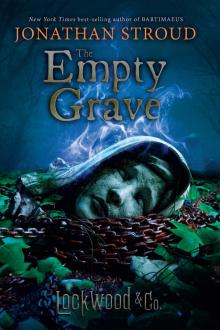 The Empty Grave
The Empty Grave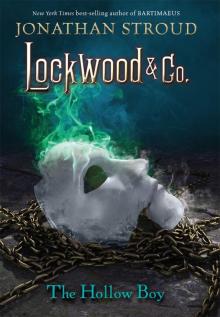 The Hollow Boy
The Hollow Boy The Last Siege
The Last Siege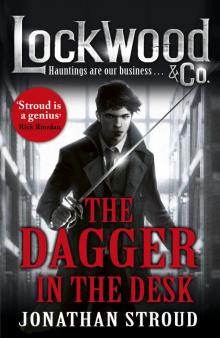 The Dagger in the Desk
The Dagger in the Desk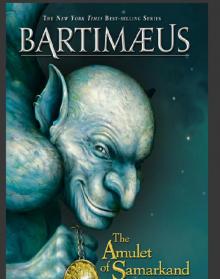 The Amulet of Samarkand
The Amulet of Samarkand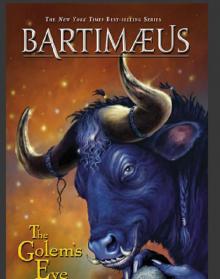 The Golem's Eye
The Golem's Eye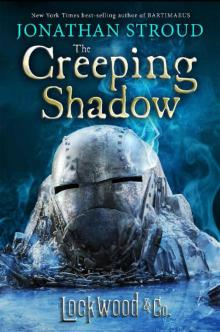 The Screaming Staircase
The Screaming Staircase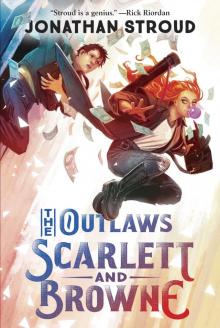 The Outlaws Scarlett and Browne
The Outlaws Scarlett and Browne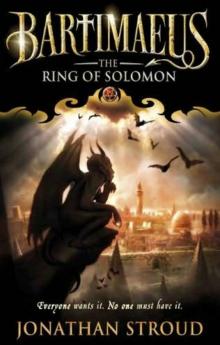 The Ring of Solomon: A Bartimaeus Novel
The Ring of Solomon: A Bartimaeus Novel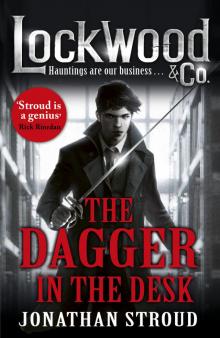 Lockwood & Co
Lockwood & Co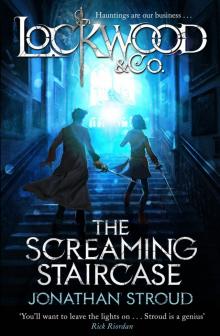 Lockwood & Co: The Screaming Staircase
Lockwood & Co: The Screaming Staircase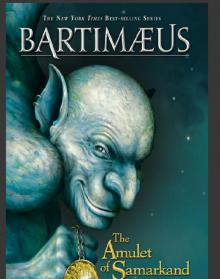 Bartimaeus: The Amulet of Samarkand
Bartimaeus: The Amulet of Samarkand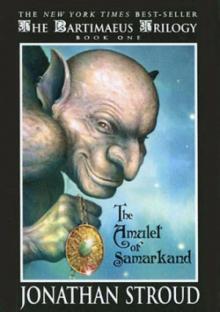 The Amulet of Samarkand tbt-1
The Amulet of Samarkand tbt-1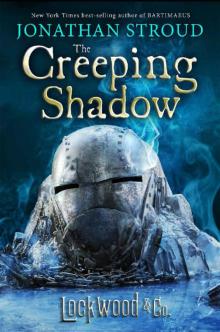 Lockwood & Co.: The Creeping Shadow
Lockwood & Co.: The Creeping Shadow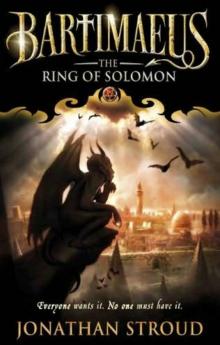 The Ring of Solomon
The Ring of Solomon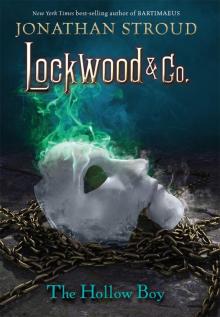 Lockwood & Co. Book Three: The Hollow Boy
Lockwood & Co. Book Three: The Hollow Boy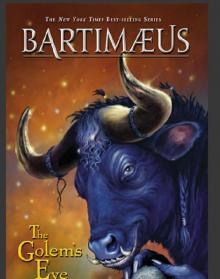 Bartimaeus: The Golem’s Eye
Bartimaeus: The Golem’s Eye